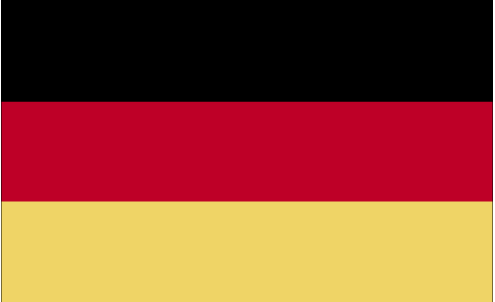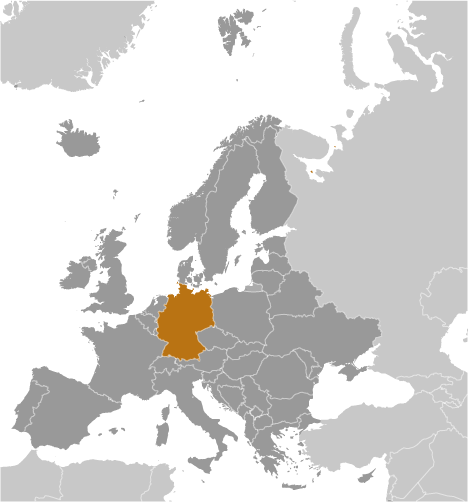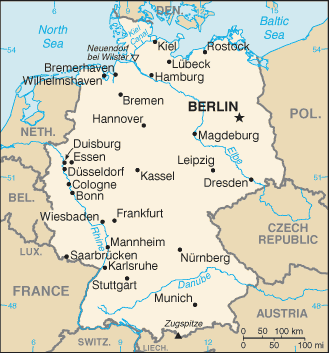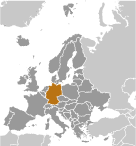
|
|
Advertisements:
GovernmentCountry name
Conventional long form Federal Republic of Germany
Conventional short form Germany Local long form Bundesrepublik Deutschland Local short form Deutschland Former German Empire, German Republic, German Reich Government type
Federal republic
Capital
Name Berlin
Geographic coordinates 52 31 N, 13 24 E Time difference UTC+1 (6 hours ahead of Washington, DC during Standard Time) Daylight saving time +1hr, begins last Sunday in March; ends last Sunday in October Administrative divisions
16 states (Laender, singular - Land); Baden-Wurttemberg, Bayern (Bavaria), Berlin, Brandenburg, Bremen, Hamburg, Hessen (Hesse), Mecklenburg-Vorpommern (Mecklenburg-Western Pomerania), Niedersachsen (Lower Saxony), Nordrhein-Westfalen (North Rhine-Westphalia), Rheinland-Pfalz (Rhineland-Palatinate), Saarland, Sachsen (Saxony), Sachsen-Anhalt (Saxony-Anhalt), Schleswig-Holstein, Thuringen (Thuringia); note - Bayern, Sachsen, and Thuringen refer to themselves as free states (Freistaaten, singular - Freistaat) Independence
18 January 1871 (German Empire unification); divided into four zones of occupation (UK, US, USSR, and France) in 1945 following World War II; Federal Republic of Germany (FRG or West Germany) proclaimed on 23 May 1949 and included the former UK, US, and French zones; German Democratic Republic (GDR or East Germany) proclaimed on 7 October 1949 and included the former USSR zone; West Germany and East Germany unified on 3 October 1990; all four powers formally relinquished rights on 15 March 1991; notable earlier dates: 10 August 843 (Eastern Francia established from the division of the Carolingian Empire); 2 February 962 (crowning of OTTO I, recognized as the first Holy Roman Emperor) Constitution
23 May 1949, known as Basic Law; became constitution of the united Germany 3 October 1990 Legal system
Civil law system
International law organization participation
Accepts compulsory ICJ jurisdiction with reservations; accepts ICCt jurisdiction Suffrage
18 years of age; universal
Executive branch
Chief of state
President Joachim GAUCK (since 23 March 2012) Head of government Chancellor Angela MERKEL (since 22 November 2005) Cabinet Cabinet or Bundesminister (Federal Ministers) appointed by the president on the recommendation of the chancellor Elections President elected for a five-year term (eligible for a second term) by a Federal Convention, including all members of the Federal Diet (Bundestag) and an equal number of delegates elected by the state parliaments; election last held on 19 February 2012 (next to be held by June 2017); chancellor elected by an absolute majority of the Federal Diet for a four-year term; Federal Diet vote for Chancellor last held after 27 September 2009 (next to be held 18 March 2012) Election results Joachim GAUCK elected president; received 991 votes of the Federal Convention against 126 for Beate KLARSFELD and 3 for Olaf ROSE; Angela MERKEL reelected chancellor; vote by Federal Diet 323 to 285 with four abstentions Legislative branch
Bicameral legislature consists of the Federal Council or Bundesrat (69 votes; state governments sit in the Council; each has three to six votes in proportion to population and is required to vote as a block) and the Federal Diet or Bundestag (622 seats; members elected by popular vote for a four-year term under a system of personalized proportional representation; a party must win 5% of the national vote or three direct mandates to gain proportional representation and caucus recognition) Elections Bundestag - last held on 27 September 2009 (next to be held no later than autumn 2013); note - there are no elections for the Bundesrat; composition is determined by the composition of the state-level governments; the composition of the Bundesrat has the potential to change any time one of the 16 states holds an election Election results Bundestag - percent of vote by party - CDU/CSU 33.8%, SPD 23%, FDP 14.6%, Left 11.9%, Greens 10.7%, other 6%; seats by party - CDU/CSU 239, SPD 146, FDP 93, Left 76, Greens 68 Judicial branch
Federal Constitutional Court or Bundesverfassungsgericht (half the judges are elected by the Bundestag and half by the Bundesrat); Federal Court of Justice; Federal Administrative Court Political parties and leaders
Alliance '90/Greens [Claudia ROTH and Cem OZDEMIR]; Christian Democratic Union or CDU [Angela MERKEL]; Christian Social Union or CSU [Horst SEEHOFER]; Free Democratic Party or FDP [Philipp ROESLER]; Left Party or Die Linke [Klaus ERNST and Gesine LOETZSCH]; Social Democratic Party or SPD [Sigmar GABRIEL] Political pressure groups and leaders
Business associations and employers' organizations; trade unions; religious, immigrant, expellee, and veterans groups International organization participation
ADB (nonregional member), AfDB (nonregional member), Arctic Council (observer), Australia Group, BIS, BSEC (observer), CBSS, CDB, CE, CERN, EAPC, EBRD, ECB, EIB, EMU, ESA, EU, FAO, FATF, G-20, G-5, G-7, G-8, G-10, IADB, IAEA, IBRD, ICAO, ICC, ICRM, IDA, IEA, IFAD, IFC, IFRCS, IGAD (partners), IHO, ILO, IMF, IMO, IMSO, Interpol, IOC, IOM, IPU, ISO, ITSO, ITU, ITUC, MIGA, NATO, NEA, NSG, OAS (observer), OECD, OPCW, OSCE, Paris Club, PCA, Schengen Convention, SELEC (observer), SICA (observer), UN, UNAMID, UNCTAD, UNESCO, UNHCR, UNIDO, UNIFIL, UNMIL, UNMISS, UNRWA, UNSC (temporary), UNWTO, UPU, WCO, WHO, WIPO, WMO, WTO, ZC Diplomatic representation in the us
Chief of mission
Ambassador Niels Peter Georg AMMON Chancery 4645 Reservoir Road NW, Washington, DC 20007 Telephone [1] (202) 298-4000FAX [1] (202) 298-4249 Consulate(s) general Atlanta, Boston, Chicago, Houston, Los Angeles, Miami, New York, San Francisco Diplomatic representation from the us
Chief of mission Ambassador Philip D. MURPHY
Embassy Pariser Platz 2, 14191 Berlin Mailing address PSC 120, Box 1000, APO AE 09265, Clayallee 170, 14195 Berlin Telephone [49] (030) 2385174FAX [49] (030) 8305-1215 Consulate(s) general Duesseldorf, Frankfurt am Main, Hamburg, Leipzig, Munich Flag description
Three equal horizontal bands of black (top), red, and gold; these colors have played an important role in German history and can be traced back to the medieval banner of the Holy Roman Emperor - a black eagle with red claws and beak on a gold field National symbol(s)
Black eagle
National anthem
Name
"Lied der Deutschen" (Song of the Germans) Lyrics/music August Heinrich HOFFMANN VON FALLERSLEBEN/Franz Joseph HAYDN Note Adopted 1922, restored 1990; the anthem, also known as "Deutschlandlied" (Song of Germany), was abolished in 1945 because of the Nazi's use of the first verse, specifically the phrase, "Deutschland, Deutschland ueber alles" (Germany, Germany above all) to promote nationalism; since restoration in 1990, only the third verse is sung
Comments
Add a new comment: |
Advertisement
Members area
Germany (Berlin):
 
GPS points from Germany (Berlin)
|
||||||||

 As Europe's largest economy and second most populous nation (after Russia), Germany is a key member of the continent's economic, political, and defense organizations. European power struggles immersed Germany in two devastating World Wars in the first half of the 20th century and left the country occupied by the victorious Allied powers of the US, UK, France, and the Soviet Union in 1945. With the advent of the Cold War, two German states were formed in 1949: the western Federal Republic of Germany (FRG) and the eastern German Democratic Republic (GDR). The democratic FRG embedded itself in key Western economic and security organizations, the EC, which became the EU, and NATO, while the Communist GDR was on the front line of the Soviet-led Warsaw Pact. The decline of the USSR and the end of the Cold War allowed for German unification in 1990. Since then, Germany has expended considerable funds to bring Eastern productivity and wages up to Western standards. In January 1999, Germany and 10 other EU countries introduced a common European exchange currency, the euro. In January 2011, Germany assumed a nonpermanent seat on the UN Security Council for the 2011-12 term.
As Europe's largest economy and second most populous nation (after Russia), Germany is a key member of the continent's economic, political, and defense organizations. European power struggles immersed Germany in two devastating World Wars in the first half of the 20th century and left the country occupied by the victorious Allied powers of the US, UK, France, and the Soviet Union in 1945. With the advent of the Cold War, two German states were formed in 1949: the western Federal Republic of Germany (FRG) and the eastern German Democratic Republic (GDR). The democratic FRG embedded itself in key Western economic and security organizations, the EC, which became the EU, and NATO, while the Communist GDR was on the front line of the Soviet-led Warsaw Pact. The decline of the USSR and the end of the Cold War allowed for German unification in 1990. Since then, Germany has expended considerable funds to bring Eastern productivity and wages up to Western standards. In January 1999, Germany and 10 other EU countries introduced a common European exchange currency, the euro. In January 2011, Germany assumed a nonpermanent seat on the UN Security Council for the 2011-12 term.